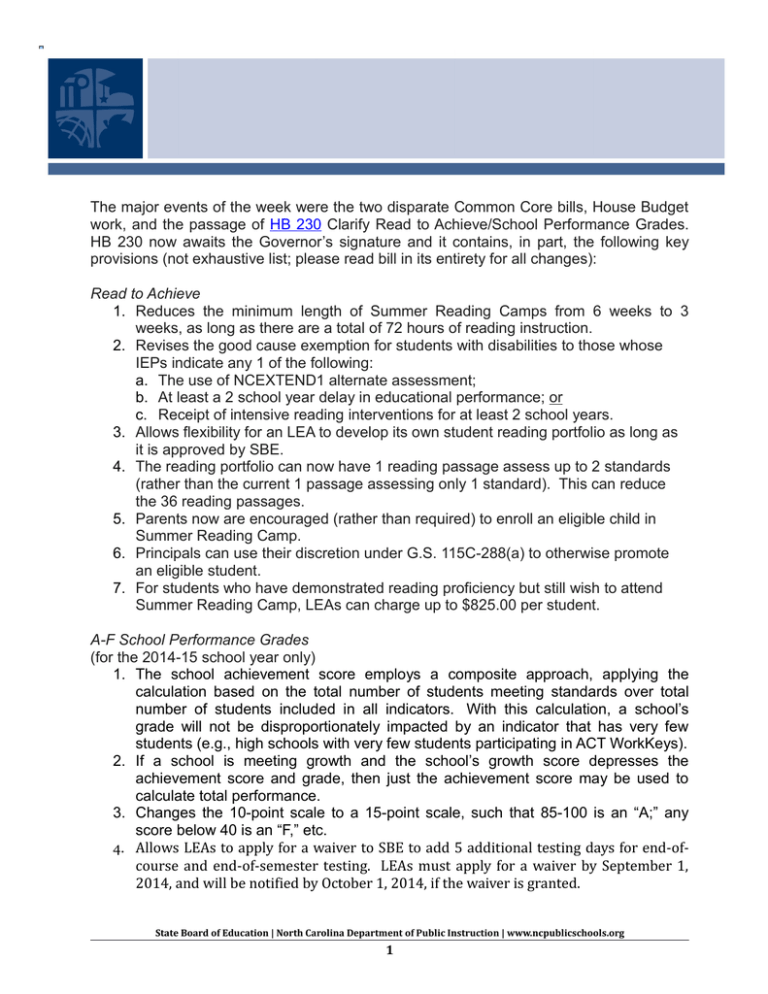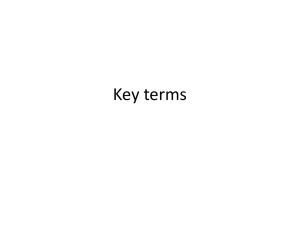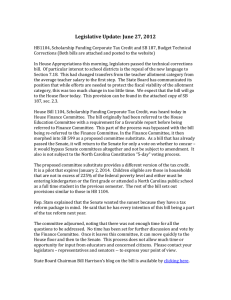The major events of the week were the two disparate... HB 230 now awaits the Governor’s signature and it contains,... HB 230
advertisement

The major events of the week were the two disparate Common Core bills, House Budget work, and the passage of HB 230 Clarify Read to Achieve/School Performance Grades. HB 230 now awaits the Governor’s signature and it contains, in part, the following key provisions (not exhaustive list; please read bill in its entirety for all changes): Read to Achieve 1. Reduces the minimum length of Summer Reading Camps from 6 weeks to 3 weeks, as long as there are a total of 72 hours of reading instruction. 2. Revises the good cause exemption for students with disabilities to those whose IEPs indicate any 1 of the following: a. The use of NCEXTEND1 alternate assessment; b. At least a 2 school year delay in educational performance; or c. Receipt of intensive reading interventions for at least 2 school years. 3. Allows flexibility for an LEA to develop its own student reading portfolio as long as it is approved by SBE. 4. The reading portfolio can now have 1 reading passage assess up to 2 standards (rather than the current 1 passage assessing only 1 standard). This can reduce the 36 reading passages. 5. Parents now are encouraged (rather than required) to enroll an eligible child in Summer Reading Camp. 6. Principals can use their discretion under G.S. 115C-288(a) to otherwise promote an eligible student. 7. For students who have demonstrated reading proficiency but still wish to attend Summer Reading Camp, LEAs can charge up to $825.00 per student. A-F School Performance Grades (for the 2014-15 school year only) 1. The school achievement score employs a composite approach, applying the calculation based on the total number of students meeting standards over total number of students included in all indicators. With this calculation, a school’s grade will not be disproportionately impacted by an indicator that has very few students (e.g., high schools with very few students participating in ACT WorkKeys). 2. If a school is meeting growth and the school’s growth score depresses the achievement score and grade, then just the achievement score may be used to calculate total performance. 3. Changes the 10-point scale to a 15-point scale, such that 85-100 is an “A;” any score below 40 is an “F,” etc. 4. Allows LEAs to apply for a waiver to SBE to add 5 additional testing days for end-ofcourse and end-of-semester testing. LEAs must apply for a waiver by September 1, 2014, and will be notified by October 1, 2014, if the waiver is granted. State Board of Education | North Carolina Department of Public Instruction | www.ncpublicschools.org 1 Kindergarten Entry Assessment (KEA) 1. Revises G.S. 115C-83.5(d) to add that: (a) the KEA shall “yield both qualitative and quantitative data” in each of the 5 essential domains of school readiness; (b) data obtained from the KEA shall be used in a longitudinal data base; and (c) the language and literacy component of the KEA may be used as a formative and diagnostic reading assessment. 2. Implements the developmental screening instrument (in literacy and mathematics) in 50% of LEAs during the 2014-15 school year, and in all LEAs by the 2015-16 school year, with additional components of the KEA fully implemented in the 201617 school year. With regard to Common Core action, the House approved its version, HB 1061, while the Senate approved a different version, SB 812. Here is a chart of some key differences (with further analysis in the pages that follow: Common Core bills Title Length Number of Commission Members Report Due Date “Common Core” Language Assessments House Bill 1061 Replace Common Core with North Carolina’s Higher Academic Standards 6 Pages 9 (3 appointed by the Senate, 3 by the House, 1 by the Governor, 2 members of SBE) Every 5 years (Ongoing Commission) Removal of “Common Core” references from the North Carolina Standard Course of Study and statute SBE is forbidden from including Smarter Balanced or PARCC assessments Senate Bill 812 Maintain State Authority Over Academic Standards 4 Pages 11 (4 appointed by the Senate, 4 by the House, 1 by the Governor, 2 members of SBE) December 31, 2015 (Commission terminated) Removal of “Common Core” references from statute SBE is required to report to the Legislature prior to implementing new assessments, including Smarter Balanced and PARCC Finally, House budget chairs have worked diligently on budget provisions for several weeks. The House will continue to work through the weekend to produce the first version of its budget which is expected to come out early next week and move through the committee process with a vote likely at the end of the week. Key Committee Meetings: June 3-4 House Appropriations Subcommittee on Education Chairman Cobey and Superintendent Atkinson gave compelling presentations to this subommittee on Tuesday, reviewing past cuts to public education, including DPI, and how any future cuts will detrimentally affect K-12 public education and the education reform initiatives enacted by the General Assembly. Here are links to documents reviewed by that subcommittee: State Board of Education | North Carolina Department of Public Instruction | www.ncpublicschools.org 2 Positions Available to the Department of Public Instruction Position Changes 1995-96 to 2013-14 DPI State-Funded Positions DPI Positions by Administrative Area Governor’s Budget and Senate Budget Comparison House Education Committee HB 1061 Replace Common Core with North Carolina’s Higher Academic Standards This measure would have SBE review and adopt standards that reflect North Carolina’s priorities and be age/developmentally appropriate. This legislation would establish the Academic Standards Review Commission (ASRC) and require SBE to collaborate with ASRC on setting and revising standards that are state-based and among the highest in the nation. The bill would forbid any State entity from entering into an agreement or contract with any other federal agency or private entity that may, in effect, cede control of the State’s control over standard setting, revision, or adoption. ASRC would be administratively housed in the NC Department of Administration and comprised of 9 members. House and Senate appointees may be parents of students enrolled in public schools, ELA or Mathematics teachers, and ELA or Mathematics curriculum experts. The duties of ASRC would be as follows: • An ongoing commission allowing no member to serve more than 2 consecutive terms. • To assemble content experts to evaluate rigor of standards, involve stakeholders, and ensure transparency. • Hold the first meeting no later than September 1, 2014 and report its recommendations to SBE and General Assembly by March 15, 2015. • Continue to work with SBE to review standards during the regular review period implemented every five years as required by SBE and report its recommendations to the General Assembly following that process. The proposal, during the 2014-15 school year, would require SBE to: • Conduct a comprehensive review of all ELA and mathematics standards and propose modifications. • Consult with ASRC to determine and adopt standard changes. • Maintain the independence of the NC Standard Course of Study (SCOS) and related assessments. • Remove the Common Core copyright and any reference thereof from the SCOS. • Report to the General Assembly prior to acquiring or implementing a new assessment instrument(s). • Consider nationally normed and field-tested assessments, aligned with the SCOS, but they cannot include assessments developed by Smarter Balanced or PARCC. Authorization to acquire or implement such an assessment must be legislated. The bill requires that LEAs retain the ability to adopt textbooks without necessary adoption by SBE. Also, HB 1061 explicitly states that the SCOS remains in effect until official notice is provided to all public school teachers, administrators, and parents. A final section of the bill would prohibit the gathering of personally identifiable data from students or their families regarding religion, political affiliation, biometric information, psychometric data, or voting history. State Board of Education | North Carolina Department of Public Instruction | www.ncpublicschools.org 3 HB 1062 Schematic Diagrams and Keys of Schools This bill passed the House unanimously on Wednesday. HB 1062 would require local school administrative units to provide schematic diagrams and keys to the main entrances of all school facilities to local law enforcement agencies. SB 370 Respect for Student Prayer/Religious Activity SB 370 passed the House on Wednesday after a prior amendment from committee; therefore, it must go back to the Senate for concurrence. The bill would allow a public school student to voluntarily do the following: pray (silently or audibly), express religious viewpoints at school, possess and distribute religious literature, organize prayer groups and religious clubs, and express religious beliefs in assignments and artwork. The student would be prohibited from these activities if the activity infringes on the rights of the school to maintain order and discipline or the rights of other students. LEAs would not be able to prohibit personnel, including coaches, from adopting a “respectful posture” during religious activity initiated by students (e.g., bowing one’s head during prayer). Some House members expressed concerns over potential constitutional challenges to this legislation; however, the House Education Committee adopted a severability clause in the event such a challenge occurred. Senate Committee on Education/Higher Education SB 793 Charter School Modifications SB 793 came up for “discussion only.” The Committee did not vote on this bill. The bill would clarify the process for review of charter applications by the NC Charter School Advisory Board (CSAB), allowing applicants to be more involved in the application process and have multiple opportunities to address the CSAB and an appeals process. Also, it would reflect SBE policy to set in statute an application fee of $1,000 and require the SBE to annually adopt a timeline, application, rubric, and specific guidelines for applicants. SB 812 Maintain State Authority Over Academic Standards (formerly titled Replace Common Core to Meet NC’s Needs) This legislation addressing the Common Core passed the Senate this week and now heads to the House. This bill would direct SBE to: • Continue to exercise its authority under the state constitution and General Statutes to adopt academic standards for public education. • Conduct a comprehensive review of all ELA and Mathematics standards and propose modification to ensure they: (1) increase academic achievement; (2) meet and reflect NC’s priorities; (3) are age and developmentally appropriate; (4) are understandable to parents and teachers; and (5) will be among the highest in the nation. • Consult the Academic Standards Review Commission (ASRC), which would be created by this bill also. ASRC would be located administratively in the NC Department of Administration, exercising its authority independently. It would be comprised of 11 members. Unlike previous versions of this legislation, it would forbid the appointment of any statewide elected official or member of the General Assembly. House and Senate appointees may be parents of public school students, Math and ELA teachers, Math and ELA curriculum experts, members of the business community, members of the post-secondary education State Board of Education | North Carolina Department of Public Instruction | www.ncpublicschools.org 4 community, or individuals who have demonstrated expertise in the development or implementation of standards. Duties of the Commission would be, as follows: • Conduct a comprehensive review of all ELA and Mathematics standards and propose modifications to ensure they (1) increase academic achievement; (2) meet and reflect NC’s priorities; (3) are age and developmentally appropriate; (4) are understandable to parents and teachers; and (5) will be among the highest in the nation. • Recommend changes and modifications to the standards to the SBE. • Recommend assessments to the SBE that are aligned to proposed standards and would reduce the number of high-stakes assessments. • Consider the impact on education and the need for professional development. • Assemble content experts to assist in evaluating the rigor of academic standards and involve stakeholders in the process. This proposed ASRC, unlike that proposed in the HB1061, would terminate on December 31, 2015 and provide a final report to the General Assembly on or before that time. This bill would not direct the SBE to remove all reference in the SCOS to Common Core; although, it would repeal G.S. 115C-174.11(c)(3), just as the House bill would. The SBE would be directed to report to the General Assembly prior to acquiring and implementing new assessments, specifically including Smarter Balanced and PARCC. The legislation lists ITBS, SAT, ACT, Aspire, and NAEP as being appropriate assessment models. This bill also recognizes that the current SCOS remains in effect until official notice is provided to all public school teachers, administrators, and parents of public school students. SB 815 Ensuring Privacy of Student Records The Senate Education Committee unanimously approved this bill and it was referred to the Senate Committee on the Judiciary I. Relevant Bills with Action This Week: House Bills HB 230 Clarify Read to Achieve/School Performance Grades (Malone, S. Martin, Brody, Samuelson) • The House concurred with the Senate’s version of this bill. This bill awaits the Governor’s signature. HB 1031 (SB 743) NC Economic Development Partnership Modifications (Murry) • Passed 2nd reading in the House on Thursday, June 5 HB 1061 Replace Common Core State Standards with North Carolina’s Higher Academic Standards (Holloway, Pittman, Speciale) • Passed the House on Wednesday, June 4 HB 1062 (SB 770) Schematic Diagrams/Emergency Access to Schools (Holloway, Johnson, Hanes, Lucas) • Passed the House on Wednesday, June 4 HB 1069 (SB 759) Unemployment Insurance Law Changes (Howard, Warren, Arp) State Board of Education | North Carolina Department of Public Instruction | www.ncpublicschools.org 5 • Passed 2nd reading in the House on Thursday, June 5 HB 1152 Eliminate Obsolete Boards and Commissions (Moffitt, Murry, Mills, Jackson) • Passed the House on Tuesday, June 3 • Referred to Committee on Rules and Operations of the Senate HB 1154 Moore County Schools Transfer of Property (Boles) • Favorable report from House Committee on Government • Re-referred to House Finance Committee HB 1193 Retirement Technical Corrections Act of 2014 (Collins, S. Ross) • Passed the House on Tuesday, June 5 HB 1194 Retirement Administrative Changes Act of 2014 (Collins, S. Ross) • Passed the House on Tuesday, June 5 Senate Bills SB 370 Respect for Student Prayer/Religious Activity (Bingham, Daniel, Hise) • Passed the House on Wednesday, June 4 SB 743 (HB 1031) NC Economic Development Partnership Modifications (Brown) • Favorable report from Senate Commerce Committee • Re-referred to Senate Committee on Appropriations/Base Budget SB 786 Energy Modernization Act (Rucho, Newton, Brock) • Signed by Governor on 6/4/2014 • Ch. SL 2014-4 SB 812 Maintain State Authority Over Academic Standards (Soucek, Tillman) • Passed the Senate on Thursday, June 5 SB 815 Ensuring Privacy of Student Records (Barefoot, Brock, Soucek) • Favorable report from Senate Committee on Education/Higher Education • Re-referred to Senate Committee on Judiciary I Meetings: June 9– June 11 Monday, June 9 3:00 PM Joint Legislative Program Evaluation Oversight Committee, 544 LOB Amendment of the 2013-14 work plan to require PED to evaluate state government use of personal service contractors and consultants. Wednesday, June 11 8:30 AM House Finance Committee, 544 LOB 10:00 Senate Committee on Education/Higher Education, 544 LOB SB 793 Charter School Modifications HB 1060 Military Student Identifier State Board of Education | North Carolina Department of Public Instruction | www.ncpublicschools.org 6 Contact Information: Rachel E. Beaulieu Department of Public Instruction Legislative & Community Relations Director 919-807-4035 Rachel.Beaulieu@dpi.nc.gov Zane B. Stilwell, II State Board of Education Legislative Relations & Policy 919-807-4068 Zane.Stilwell@dpi.nc.gov Loretta Peace-Bunch Legislative Assistant 919-807-3403 Loretta.Peace-Bunch@dpi.nc.gov State Board of Education | North Carolina Department of Public Instruction | www.ncpublicschools.org 7

